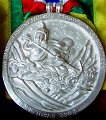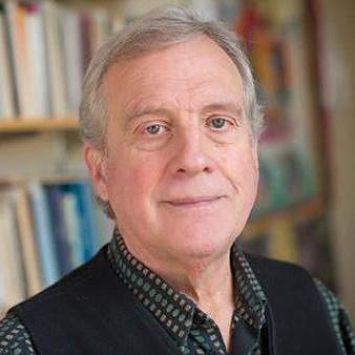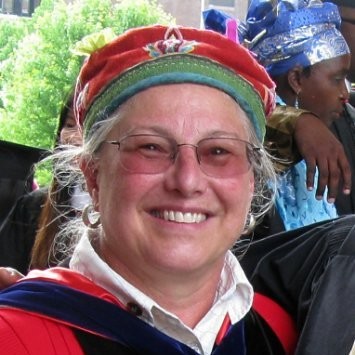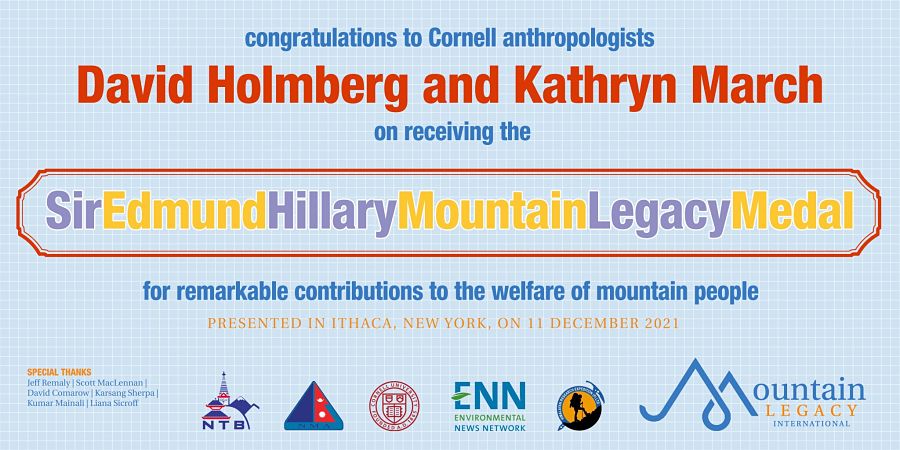
|
The Sir Edmund Hillary Mountain Legacy MedalHome Nomination Background Medalists Mountain Legacy Collaborate Sitemap Contact |
 |
This article is adapted from the letter of nomination submitted by anthropologist Alfred Pach III.
Cornell ethnographers David Holmberg and Kathryn March to receive the 2021 Sir Edmund Hillary Mountain Legacy Medal for remarkable service in the conservation of nature and in the equitable advancement of human welfare in mountainous regions


Both Kathryn March and her husband David Holmberg are eminent scholars, cultural anthropologists, now emeriti at Cornell University. Beginning in the 1970s they have carried out ground-breaking ethnographic research in Nepal and continued in this work for over 46 years Their early field work and publications contributed substantially to international interest in and an appreciation of the culture and history of the ethnically-diverse mountain communities of Nepal, and especially of Tamang people and culture.
The March-Holmberg legacy stands as a shining example of a lifetime commitment to scholarship, teaching and service. They have produced landmark research that has advanced intellectual understanding of human experience within diverse cultural worlds, taught US and Nepali students and supported burgeoning Nepali scholars and scholarship. They have worked in service to directly support the welfare of individuals and communities in their research area in Nepal. They have also contributed to Nepali society in general through their research, teaching and development work.
First, and noteworthy among their achievements is that they established and administered the Cornell University Abroad in Nepal Program, which became one of the most respected exchange programs in the country. From the beginning their emphasis has been on service to their hosts: Tribhuvan University, with whom they collaborated, and the Tamang communities in which they and their students carried out research and development projects. All American participants learned Nepali. Nepali graduate students were embedded within and participated in the program on a one-to-one basis, with both all expenses paid and an opportunity to participate in advanced Nepali culture and social science studies, and received training in research design and fieldwork methodology. Nepali scholars were brought to study, carry out research, and teach at Cornell. They have mentored Nepali students at Cornell and supported organizations to enhance their experience and opportunities. The net result has been a win-win, both for Nepali scholars and for American students.
Secondly, March and Holmberg have engaged in a sustained relationship with the Tamang communities in which they carried out their own research. By bringing their students and organizing treks, they created an ecotourism sector in communities where none had existed before. They have provided economic support at difficult times, including during the Maoist insurgency and the earthquake recovery period. The environmentally sound, earthquake-resistant center which March has created with a US building expert and Nepali community members is a model safe shelter that can serve in future development projects. It will also serve as a site for the development of the health, education and economic well-being of Nepali women. Working on independent projects or in collaboration with USAID, UN/FAO or Nepal’s National Planning Commision, they have brought attention to the economic and social realities of life in village Nepal.
Third, at a time when isolationist tendencies have dominated politics in their country, they built a vibrant, outward-looking program at Cornell, held public lectures and informational events featuring notables such as the ambassador of Nepal, and organized festivals (notably for the annual Dasain holiday) that brought together the larger Nepal community in Ithaca. They have also supported local institutions such as Namgyal Monastery, as the American repository and archive of His Holiness the Dala’i Lama’s and of all previous Dala’i Lamas’ collected works. This archive will serve as an international center for scholars, for the Tibetan people and their religious culture and as a site for the world recognition of Tibetan culture.
Finally, it must be said that Holmberg’s and March’s anthropological research is laser focused on the experiences, ideals and the forces which impact their focal research communities. Building a schoolhouse or a suspension bridge may make a huge difference to a poor community, but the key to change is understanding the myths, social structures, and practices that define and constrain political and economic opportunity. These anthropological parameters are in part intrinsic to the social structures that create economic and gender relations within the community itself, but they are also a function of political economic relations at a state level and in the dominant cultural and economic interactions among local social groups. Gender inequity, forced labor (even slavery), caste disparities, exploitation of migrant workers, and other impediments to social justice are not features that can be unilaterally abolished by the community itself. The history and dynamics of these issues must be clearly and widely understood and addressed in order that communities on the periphery of the wider society can manage and optimize their own opportunities. Holmberg and March have tried to lift the veil that obscures comprehension of precarious conditions and forms of exclusion, thereby revealing the profound cultural strengths and meaning of local cultural practices and expressions that prevail in a region of extraordinary natural and cultural wealth.
All in all, it is clear that Dr. March and Dr. Holmberg have made remarkable contributions to mountain communities; that these contributions are consistent with the Hillary Model of development assistance, predicated on long-term bottom-up collaboration, and also project the evolution of that vision into the more complicated context of the twenty-first century; and that broader acclaim and recognition of their work might serve to sustain and promote their projects in Nepal and at Cornell University, a legacy worthy of Sir Edmund Hillary and the mountain people he loved. It is hard to imagine candidates more deserving of the Sir Edmund Hillary Mountain Legacy Medal than Dr. Kathryn March and Dr. David Holmberg.

If you would like to add your congratulations, reminiscences, or photos to this page, please send them to Seth Sicroff (sicroff@hillarymedal.com).
Harshwanti Bisht: CONGRATULATIONS to Prof David Holmberg and Prof Kathryn March for the recognition of their outstanding and dedicating work.
Jack D. Ives Their joint work amounting to an almost lifetime commitment is most impressive and admirably ranks amongst the forerunner medalists.
Teiji Watanabe: I think we should look at the careers of David Holmberg and Kathryn March in a broader context. Due to Nepal's unsurpassed natural beauty and the warmth and hospitality of the people, the recently opened country attracted two scholar-explorers of titanic stature: Swiss geographer Toni Hagen and Austrian anthropologist Christoph von Fürer-Haimendorf. They blazed the trail for a generation of geographers (including my mentor Jack Ives) and anthropologists (including Sherry Ortner, John Hitchcock, David Holmberg and Kathryn March), who exponentially deepened the field of scholarly talent through their students, including (to name just a few) Barbara Brower, Austin Lord, Alton Byers, Alfred Pach, Sara Shneiderman, Stan Stevens, Mark Turin, as well as their grand-students, notably Dhananjay Regmi. The impact of these scholars is not just in our greater understanding of the people and landscape of Nepal; in collaboration with their networks and their affiliated institutions (and I would emphasize the long-term commitment of Wisconsin, Cornell, and Hokkaido universities), they have advised and empowered the programs of major international agencies such as USAID, UNESCO (especially the MAB-6, the Man and Biosphere project that launched ICIMOD), the German GIZ, Swiss SDC, Canadian CIDA, and many others that have addressed the increasingly complex opportunities and challenges facing Nepal. However, I must say that of all these scholars, few or none have embedded themselves so long and so thoroughly in the communities they studied as March and Holmberg, finding their own Hillary adventure in helping marginalized peoples reach their potential. I support their candidacy for the Sir Edmund Hillary Mountain Legacy Medal.
Johan Reinhard: Both Kathy March and David Holmberg well deserve this recognition in view of their decades of work in Nepal and the considerable efforts they have made to help many Nepali individuals and communities through difficult times, both past and present.
Dipak Gyawali: I have known Kathryn and David, both of whom were on the advisory board of Nepa School of Social Sciences and Humanities (that was spun off by Social Science Baha, Rato Bangala School and Interdisciplinary Analysts) that I chaired. I cannot think of two better people than Kathrine and David who deserve this. Congrats Dan. Amazing recognition for your years of dedicated service. Couldn’t happen to a nicer guy!
Anonymous former director of Fullbright Commission of Nepal Professor March taught anthropology at Cornell University for many years but is now retired. She started coming to Nepali in the early 1970s. She did lots of fieldwork in Nepal, particularly among Tamangs. She speaks excellent Nepali and Tamang. She has definitely made a number of very significant contributions to US - Nepal relations and to the study of highland peoples. She has done important anthropological research on gender and marginalized communities and also contributed through her teaching. Her Phd and MA students (including Americans and Nepalis) have done lots and lots of great work in Nepal and other countries. Her mastery of Nepali and Tamang is particularly impressive. Her love and commitment for Nepal has inspired students for decades.
Since the early 1970s, David Holmberg has done very thorough research on Tamang communities and published in top journals. He has done a lot to help outsiders understand religious practices among the Tamang as well as the general relations of Tamang with the Nepali state over time. More broadly, this work has helped to show the sophistication and complexity of Tamang culture. With Prof March, Prof Holmberg established Cornell as perhaps the top place to study Nepal in the U.S. over many years. They mentored a large group of anthropologists who do some of the best academic research on Nepal."
Kul Bahadur Gurung: Dr. Kathryn March and Dr. David Holmberg deserve the Hillary Medal for this year because their contribution to society is really admirable.
Pramod Kumar Jha: I personally know the contribution of Prof Kathryn March and Prof David Holmberg.They both have not only excellent academic background, enhanced knowledge, but also did a great service to mountain community, particularly in Nepal. Hence, I endorse the nomination of Prof March and Prof Holmberg for the Sir Edmund Hillary medal. I believe they deserve it.

|
Home
Please Support the Sir Edmund Hillary Mountain Legacy Medal |